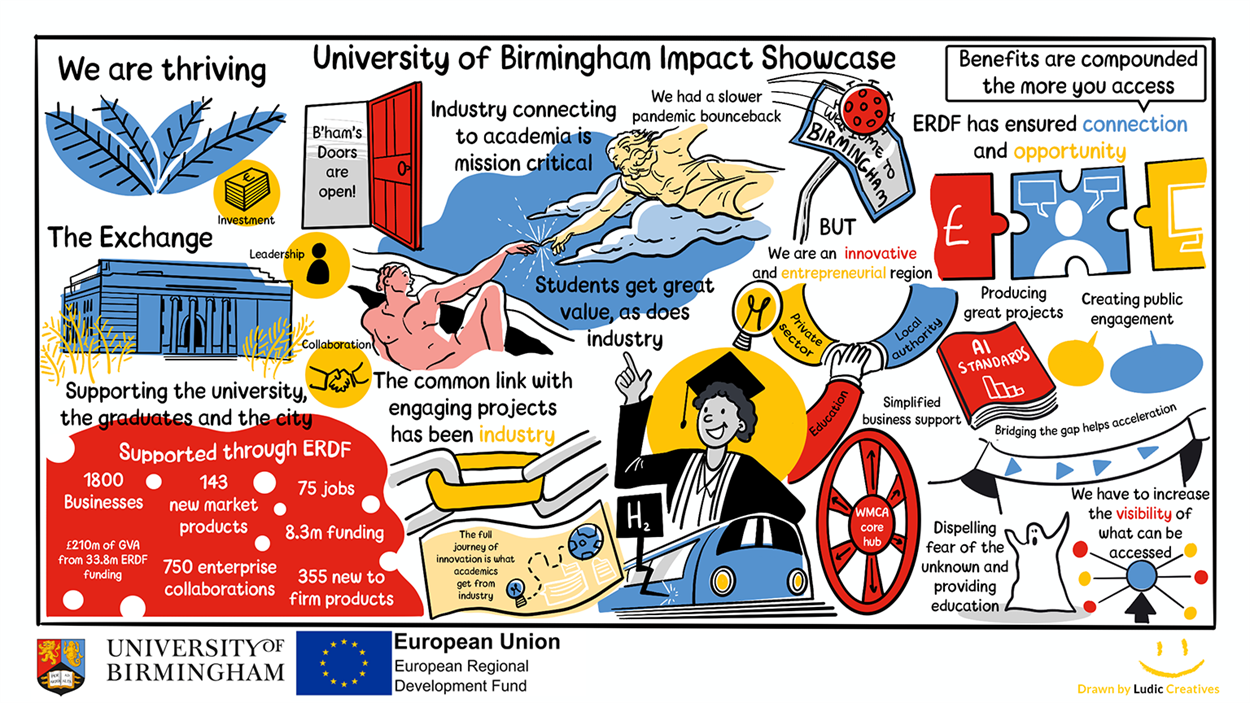Business Support Programmes from the ERDF
In 2016 the University of Birmingham received funding from the European Regional Development Fund (ERDF) to deliver, alongside our delivery partners, 13 ERDF projects. Since then, these projects have supported over 1,800 SMEs creating over 75 jobs and securing over £8.3m of additional funding. The economic impact of the projects is remarkable, from £33.8m of ERDF funding, over £210m of GVA has been created with a total of £62.6m total project spend.
Supporting our regional SMEs
The ERDF programmes were concentrated in key growth sector areas of the economy including health-tech, energy, advanced materials and digital manufacturing.
These outcomes have been delivered through targeted advice and support to business, working closely and in collaboration with University academics to develop innovative products and services.
As a result of the support provided, over 143 businesses have introduced new-to-the-market products, and over 335 enterprises have introduced new-to-the-firm products. The projects have enabled 710 enterprises to collaborate with research institutions. These collaborations have created relationships that continue to grow and flourish, thorugh working with other areas of the University and accessing furher funding opportunities.
The University celebrated the impact of the ERDF projects in June 2023 with a visual scribe on hand to capture the key moments thorughout the day. See the results below.

Find out more about the ERDF projects here – PDF (2.29Mb)
ERDF Projects delivered by the University of Birmingham
The Advanced Materials Characterisation and Simulation Hub (AMCASH) supported SMEs with industrial research and new product development involving microscopy, polymers and modelling.
The Centre for Innovation in Advanced Measurement in Manufacturing (CIAMM) helped eligible SMEs discover the full potential of quantum technologies across a broad range of industries.
DIGI-RAIL provided long-term innovation support to eligible SMEs on developing digital products and services for the rail industry.
Science 2 Industry was an innovative programme that helped small eligible SMEs access world-class science and hi-tech expertise to overcome product, process or R&D-based technical challenges.
The Advanced Manufacturing Technologies that Create, Activate and Automate (AMTECAA) programme helped eligible SMEs better understand and take advantage of new industrial digital technologies.
The Alternative Raw Materials with Low Impact (ARLI) initiative drive collaborative R&D enabling SMEs to develop products and processes that improve efficiency in the use of raw and waste materials and effective alternatives.
The Accelerating Thermal Energy Technology Adoption (ATETA) initiative was designed to provide regional SMEs with high level access to energy-related R&D facilities.
The Centre for Research into Environmental Science and Technology (CREST) focused on Research and Development support for environmental science-based SMEs in Shropshire and Telford & Wrekin, with the aim of addressing the area’s productivity challenges and bringing products and services to market.
The Medical Technologies Testing and Evaluation Centre (MD-TEC) was a facility based within the Institute of Translational Medicine designed to support medical technologies and life science businesses across the region.
The Data-Enabled Medical Technologies and Devices Hub (DEMAND Hub) was a programme for the Black Country LEP region and supported SME businesses in, or looking to enter, the healthcare market.